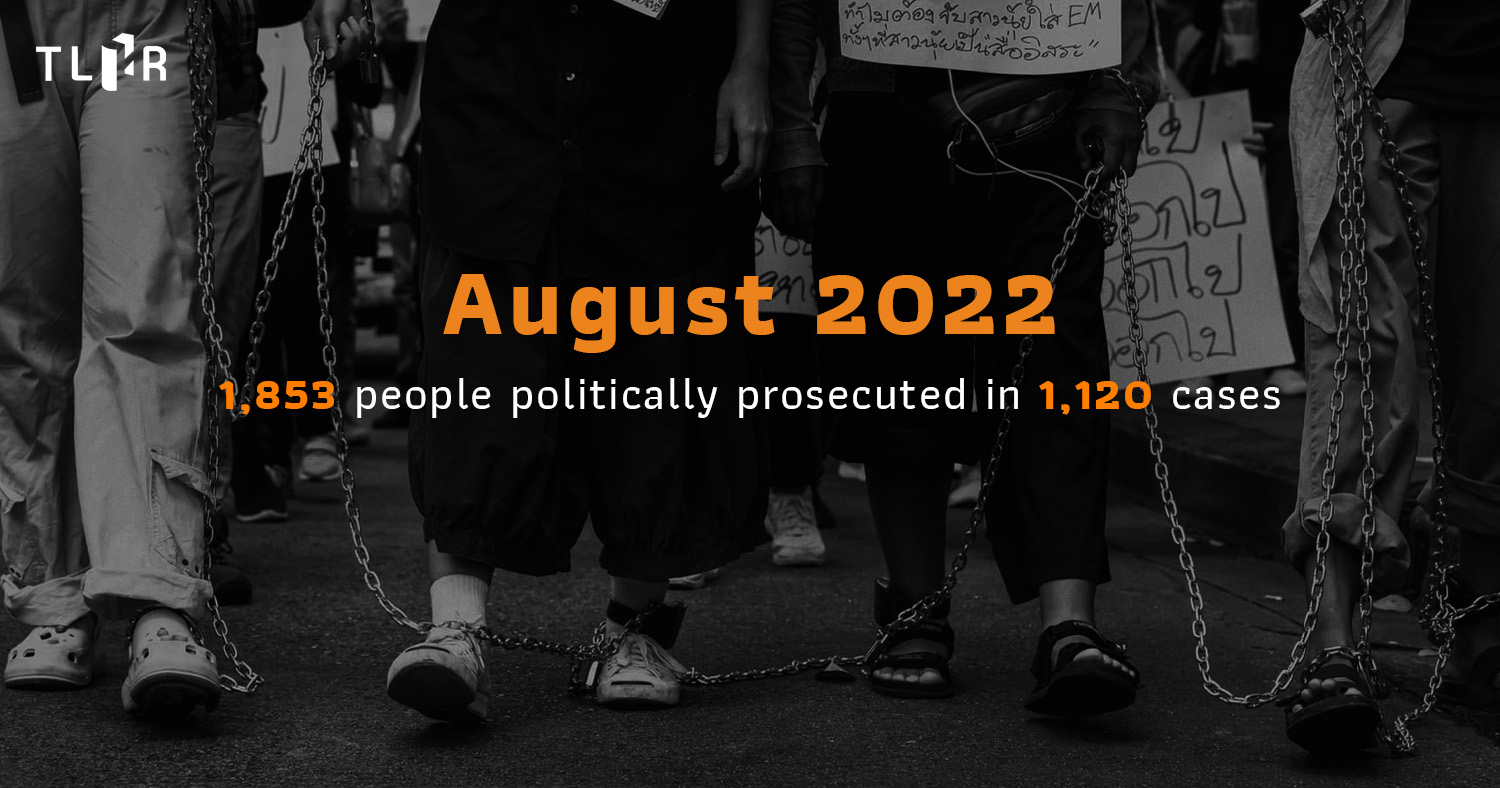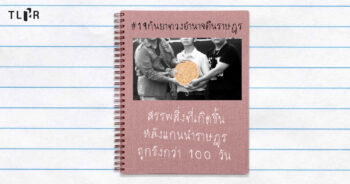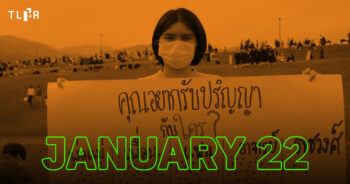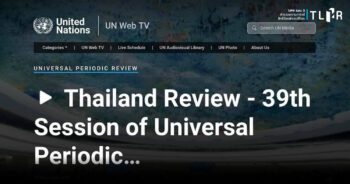In August 2022, at least 29 individuals are still in detention during their political trials. Arrests under section 112, the lèse-majesté law of Thailand’s Strictest Criminal Code continue to occur periodically with the police usually seeking arrest warrants from the court immediately without issuing summons prior to making an arrest . Additionally, the court continued to further dismiss Emergency Decree cases that resulted from the defendants’ political participation.
According to TLHR’s statistics, since the beginning of the “Free Youth Movement” on 18 July 2020 until 31 August 2022, at least 1,853 people in 1,120 cases have been prosecuted due to their political participation and expression. This number includes 283 children who are under 18 years old.
Compared to the statistics as of the end of July 2022, 10 more people in 12 cases have been prosecuted this month (counting only those that had never been charged before).
If we also count those who have been charged in multiple cases, there would be at least 3,685 incidents of prosecution in total.
The prosecution can be categorized according to key charges, as follows:
1. The “royal defamation or lèse-majesté” charge under Section 112 of the Criminal Code: at least 210 individuals in 228 cases.
2. The “sedition” charge under Section 116 of the Criminal Code: at least 126 individuals in 39 cases.
3. Charges of violation of the Emergency Decree: at least 1,467 people in 647 cases (since May 2020 when the first legal action against political protesters and activists was initiated).
4. Charges under the Public Assembly Act: at least 107 people in 75 cases.
5. Charges under the Computer Crime Act: at least 144 people in 165 cases.
6. Contempt of court charges: at least 36 people in 20 cases; and insult of court charges involving at least 27 people in 7 cases.
Among the 1,120 cases, 219 have concluded, mostly with the accused agreeing to pay fines imposed by the police or the court. This number includes 23 cases in which the public prosecutors did not indict the accused.
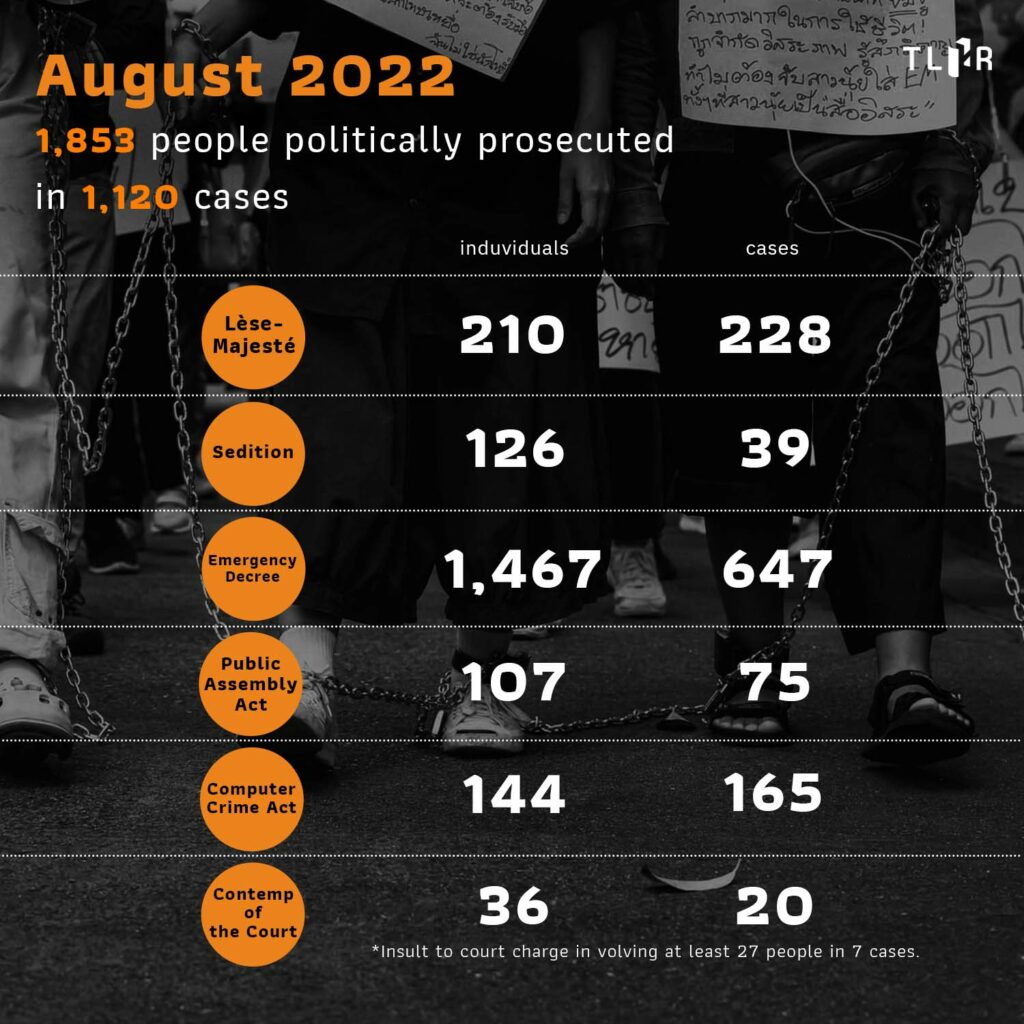
The key developments to the situation relating to political prosecutions in August 2022 are as follows:
Arrests under lèse-majesté charge continue to occur with a worrisome tendency of court decisions
Last month, the number of people accused of/prosecuted under lèse majesté or Section 112 has risen to at least 210 in 228 cases, an increase of 2 people and 4 cases compared to the previous month. Among this number were 17 children, at least three of whom are under detention during trial.
New notable cases include the case of ‘Mint Nad Sin Patiwat’’ (Revolutionary Dancing Art), who was arrested for sharing three posts containing a picture of herself raising a banner with a text criticizing the trial of lèse-majesté cases in front of the Bangkok South Criminal Court. This complaint was filed by Piyakun Wongsing, a member of the Center for People Protecting the Monarchy (CPPM), at Yannawa Police Station. Another case is Monkol ‘Bas’ Thirakhot‘, who was arrested in Chiang Rai and charged for making two posts in July. This is his third lèse-majesté case. The two were arrested by the police who requested and obtained their arrest warrants from the court without first issuing summons to them.
This particular pattern with respect to Section 112 cases—i.e., the police by passing the summons procedures—has been occurring more frequently in the past several months. Prior to that, police tended to first issue summons to the accused during 2020-2021.
Last month, the Court of First Instance also issued verdicts for at least four lèse-majesté cases. Two cases were ruled guilty, including that of Kanlaya, who was sentenced to a 6-year jail term from Narathiwas Provincial Court for posting two texts, and Port Faiyen, who was sentenced to a 9-year jail term for posting three texts. Port’s sentence was reduced to 6 years due to his cooperation at the trial. These two were granted bail during appeal.
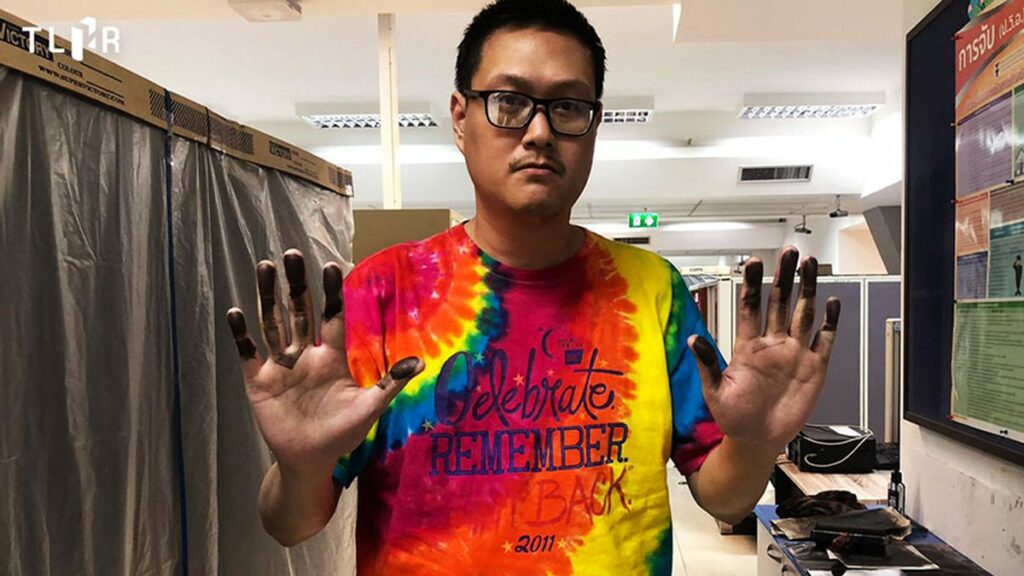
There are also two other cases that the defendants made a confession. In one case, Army Officer Methin was accused of offending King Maha Vajiralongkorn during a squabble with another person in a car accident. The court sentenced him to a 5-year jail term, reduced to 2 years and 6 months given his confession, without suspension. In this case, the defendant tentatively decided not to appeal the conviction.
The other case that the defendant confessed and the court gave a suspended sentence was the case of Chonlasit’s, a 21-year-old rubber farmer who shared a picture resembling King Maha Vajiralongkorn on his Facebook story. The Kantharalak Provincial Court gave a suspended sentence of two years, pointing out that investigation showed that Chonlasit had no criminal record and was simply being careless. The defendant did not demonstrate other acts similar to those stated in the allegation and, thus, deserved a second chance.

The Court further dismissed 6 Emergency Decree cases, whereas public prosecutors decided not to indict two cases.
There are new cases related to the violation of the Emergency Decree that stemmed from political expression. Meanwhile, the court has further dismissed six cases following trials, including the Saraburi car mob case, Suratthani car mob case, Yala car mob case, the case involving the protest in front of the Border Patrol Police Region 1 on 2 August 2021, the case of the 10th year commemoration activity of the death of ‘Se Daeng’ at Lumpini Park on 13 May 2020, and the case of the protest in Chiang Rai at the Clock Tower in Chiang Rai. The public prosecutor further issued non-indictment orders for two Emergency Decree cases in the past month.
Nevertheless, there were two cases last month where the court found the defendants guilty: the case of the protest in front of the Nation Building on 29 October 2020 and the case of the rally from Udomsuk Intersection to Bangna Intersection on 1 November 2020. The Phrakhanong Criminal Court ruled that the speakers at the events were responsible for implementing the disease prevention measures as determined by the government and, thus, found them guilty and imposed a fine on the defendants.
Overall, the court has already dismissed at least 24 cases and the public prosecutors have decided to not indict the accused in 20 cases. Seven cases resulted in a conviction, mostly with a fine penalty. This reflects how the charges under the Emergency Decree were used as a political tool by the police to suppress political protests in the past two years rather than to control the pandemic. The aim was to impose legal burdens on leaders and participants of the protests, notwithstanding the fact that most of them were eventually found innocent in the end.
At the same time, even though the court decisions on the Emergency Decree cases have shown a clearer direction towards dismissal, public prosecutors still continue to issue indictments.

The contempt and insult of court cases increase by 1 each.
The past month also saw a new contempt of court case. The case concerned a citizen who travelled to give moral support to the defendants of the Saraburi car mob case on the day of verdict reading. After the trial, court officers found the said citizen in the act of recording a video clip in front of the courtroom. He was accused of contempt of court and underwent an examination immediately on the same day. Seeing that the circumstances were not serious and that the accused admitting to wrongdoing as a result of carelessness, the court simply gave him a warning. The citizen also pledged not to repeat such behavior.
Meanwhile, one new case of insult of court under Section 198 of the Criminal Code was initiated: the case of “Manee” and “Jinny”. The duo gave a speech criticizing the court’s work during an event that called for the right to bail for “Bung and Baipor” in front of the Bangkok South Civil Court on 15 July 2022.
In this case, Santi Chookitsappaisarn, deputy director-general of the Bangkok South Criminal Court, authorized the filing of complaint against the two. Initially, the Bangkok South Criminal Court denied bail for Manee and Jinny, which led them to be detained for nine days before their bail was finally granted on appeal.
The cases of contempt and insult of court have important implications. Both charges concern an act directed at the court who is a party to the dispute. Meanwhile, the court’s role is also to examine and deliberate the dispute, as well as issue an order or decision for it. This risks a lack of judicial independence in the trial.
The court’s role in the large number of political cases in the past two years has led to an increase in public criticism against the judiciary. Viewed thus, the lawsuits that have happened are a reflection of the public’s sentiment towards Thailand’s judicial system.
